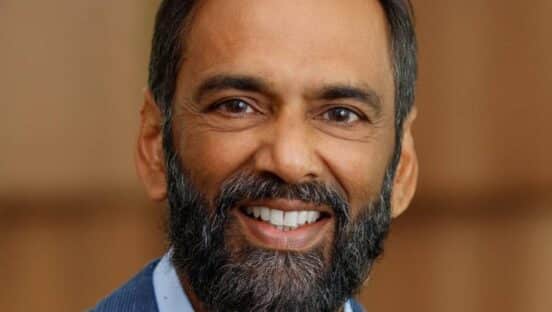In recent years, the quick-service industry is seeing more brands than ever make the leap from franchisee to franchisor. Long-standing franchisees of powerhouse brands such as Yum! Brands and Jack in the Box transitioned into purchasing concepts of their own to diversify their portfolio and put their experience to the test.
Ampex Brands, a Texas-based franchisee of chains such as Pizza Hut, KFC, Taco Bell, and 7-Eleven, acquired Au Bon Pain from Panera in 2021 and bought bellagreen in 2022. Ampex Brands operates with more than 500 units, and with these new acquisitions, moved into the franchisor seat for the first time in its 16-year history.
Tabbassum Mumtaz, CEO of Ampex Brands, says there are certainly “growing pains” behind the transition. He stresses that understanding the difference between the franchisor and franchisee systems is often the biggest hurdle companies face.
“Once you get into the franchisor position, you realize it’s more than just collecting royalties,” Mumtaz explains. “A lot of work goes behind it. Sourcing the product, the iteration of new products and marketing, making sure franchisees are happy, collecting sales information, it is all-important.”
Despite the increase in responsibilities, Mumtaz expresses growth has provided key learning opportunities and experiences. Although as a franchisee Ampex Brands nets $500 million in yearly revenue through its Yum! holdings and 7-Eleven locations, Mumtaz sought a different approach for the future direction of his company.
“If you think about the brands we have, there was very little space for us to grow within the franchise concept,” Mumtaz says. “The only other option was to either buy a franchise or create our own unique concept. So, that was one of our biggest motivators.”
Mumtaz defines finding the balance between franchisor and franchisee as a “humbling experience.”
“Learning from each branch helps,” Mumtaz says. “So, we have adopted aspects from our different brands and implemented them to ensure that the learning is there.”
While operationally the brands are separated according to their strengths to keep things simple, Mumtaz draws connections with cross-training and weekly newsletters. Additionally, the geographic location of units is strategically placed to provide extra support when needed.
“Our units are all next to each other … in Dallas for example, we have around 150 units for different brands. We seek help from each other—especially for team members,” Mumtaz explains. “If someone is working two jobs, we would rather have them working for two of our brands. Flexible hours, sharing our teams, and leadership visiting from different brands have helped us operationally.”
Yadav Enterprises, the largest Jack in the Box franchisee and significant investor in the ownership group of TGI Fridays, has taken a path akin to Ampex Brands with the acquisition of Taco Cabana in 2021.
Yadav Enterprises is also a franchisee of Denny’s, El Pollo Loco, and Corner Bakery Café, with roughly 340 locations spread across Northern California, Texas, and six Midwestern states. It purchased the 148-unit Taco Cabana business for $85 million. In fact, news of this purchase came just a day after Ampex Brands announced it would acquire Au Bon Pain. In addition, Yadav Enterprises also a bought controlling interest in Nick the Greek last year.
Anil Yadav, CEO of Yadav Enterprises, expresses similar sentiments toward authority shifts.
However, he affirms, “The execution doesn’t change.”
While standards may not differ, there is no denying Yadav and Mumtaz felt the pressure of becoming a franchisor.
Yadav says the responsibility of wins and losses falls squarely on the franchisor’s shoulders. Moreover, the biggest hurdle he faced with the purchase of Taco Cabana was the adjustment from a publicly traded company to a privately held one.
“The mindset is different,” Yadav explains.
“There is a culture difference between public and private currency and the way you obtain your capital needs. That switch, and the switch from franchisee to franchisor, is all in the mindset.”
Once Yadav adjusted his outlook and recognized the duty shifts, finding the balance in Yadav Enterprises’ portfolio became seamless.
“I’ve been in the business for so many years, and there’s been time to rebuild and learn from any mistakes,” Yadav says. “Franchising, having mentors, learning the best practices that work for other brands have all made things easier for me to implement and change my mindset.”
Things like reworking the front and back of the house, investing in innovations, simplifying product procedures without sacrificing quality, and reforming displays so customers can order products easier are all ways Yadav Enterprises found success in both franchisee and franchisor segments.
Yadav believes the same core business practices that made him successful as a franchisee will be the same ones that grow his brand as a franchisor.
He points to a future revitalization of the Taco Cabana brand and opportunities for additional acquisitions of Jack in the Box locations.
No matter if a brand takes the seat of a franchisor or a franchisee, objectives are still the same, Mumtaz says.
“We want to fix ourselves,” the CEO says. “We want to make sure that our product is good, and that our customers are happy. Every day is a new learning opportunity.”


